This piece also appears in The Weekly Standard.
The authors of this statement do not make an obvious team. Over the past four decades we have never voted for the same presidential candidate. We’ve worked in White Houses of different parties. One of us was a senior aide to a presidential candidate who sought to replace the president the other worked for.
We’ve differed on major policy issues. One of us vigorously backed the war in Iraq; the other just as vigorously opposed it. We’ve publicly debated many times, usually focusing on our differences. These disagreements persist.
But we write now to stress what we have always agreed on, because the times demand it. The basic institutions and principles of liberal democracy are under assault. Many of us who are defenders of this distinctive form of self-government have tended to take for granted widespread agreement on these principles; we have had confidence in the strength of these institutions. This is a complacency we can no longer afford.
So as a Democrat and a Republican, we want to say this: We stand together in defense of the institutions of world order conducive to peace, prosperity and freedom that the past 12 presidents, six of each party, have worked to build and uphold. We stand together in defense of constitutional, orderly, and civil self-government that respects civil liberties and equal rights and the rule of law, and rejects bigotry of every kind. We stand together in our conviction of the continued vitality of the American Dream, secured by engagement with a hopeful future based on pride in the accomplishments of the past.
And we stand together against an alternative right disdainful of the traditions of American conservatism and a vocal left that blends socialist economics with identity politics. We stand together against a dangerous impatience with the legal forms and constitutional constraints that are guarantors of our liberty. We stand together in defense of an open, generous liberal democracy as the strongest foundation for addressing the very real challenges that we face and the legitimate frustrations with the status quo that we feel.
Our form of government, in short, is fundamentally sound. Not so our parties and our politics. It is in this spirit that we make the case for a New Center, one that does not split the difference between Left and Right but offers a principled alternative to both. Its core tenets—Opportunity, Security, Accountability, and Ingenuity—can respond to the challenges of the present and chart a path to the future.
Opportunity means that all Americans should be able to go as far as their gifts and drive can take them. But gifts mean little without the chance to develop them, and drive means little without a chance to exercise those gifts. Equal opportunity does not mean equal results, but the invisible hand does not create equal opportunity. Nor does inclusion suffice in the absence of vigorous economic growth.
The policies best suited to enlarge opportunity are a matter of important debate, but we need such policies. Without them, too many Americans will feel excluded and will be excluded from the American Dream.
If opportunity is a distinctive principle of American government, security is a basic purpose of every government. The reasons are clear: not only do all peoples crave safety and stability, but also the lack of security generates fear. A fearful people cannot face the future with confidence. Fear can lead to the embrace of policies that are counter-productive, abroad as well as at home. We all know the line from Franklin Roosevelt’s First Inaugural Address: “The only thing we have to fear is fear itself.” We are apt to forget his explanation: fear “paralyzes needed efforts to convert retreat into advance.” Fear is a problematic motivator and an even worse guide.
Although the quest for security is fundamental, a degree of risk and uncertainty is inherent in human life. This is why the quest for absolute security is self-defeating, at home and abroad. The harder we try, the greater the cost to other things we value, such as economic dynamism and productive relations with other nations.
Accountability is a basic principle of free governments and free societies. Through our collective choices, we create a framework of offices and institutions we believe are compatible with the public good, and we authorize individuals to act within this framework. The people have a right to expect that when powerful individuals are acting without regard to the public good or lack the competence to promote it, they will be held accountable for their mistakes. The 2008 financial bailout infuriated Americans across the political spectrum because it appeared to violate this principle. More broadly, many Americans have concluded that economic, social, and political elites are gaining wealth and power at the expense of ordinary people. Such a conclusion puts attachment to our governing institutions at risk.
Americans see ourselves as problem-solvers, and we’ve solved a lot of them over the centuries. If machines aren’t working, we fix them, and similarly for our institutions and policies. In the depths of the Great Depression, FDR called for “bold, persistent experimentation.” Ronald Reagan, who voted for FDR four times, emphatically agreed. The American ingenuity that has produced a stream of world-changing inventions can also reshape the way we govern ourselves. If our budget process no longer works the way it was intended, we can fix it. If our political parties have forgotten how to cooperate and even how to govern, we can do something about that too.
Americans do not believe that the status quo is the best we can do. We will tolerate mistakes along the way, but we will not tolerate the unwillingness of those in power to institute needed reforms. We know that American ingenuity, which usually finds a way to succeed in the private and voluntary sectors, can be effective in our public life as well.
Opportunity, security, accountability, ingenuity—these are the pillars of a New Center. We do not know what policies a New Center will yield. Nor can we predict what institutional form or even party alignment it will take. But the alternative to a coherent and effective New Center is a degree of public discontent that could end by undermining democratic self-government itself. For the sake of liberal democracy and republican self-government, we should take Lincoln’s words to heart: “The occasion is piled high with difficulty, and we must rise with the occasion. As our case is new, so we must think anew and act anew.”
The Brookings Institution is committed to quality, independence, and impact.
We are supported by a diverse array of funders. In line with our values and policies, each Brookings publication represents the sole views of its author(s).






Commentary
Op-edA New Center
November 29, 2016